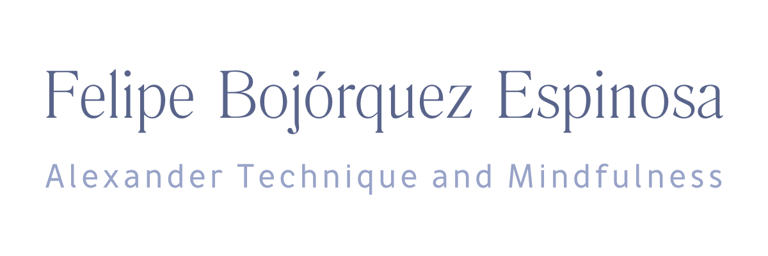End-gaining: The Origin of Self-Destructive Use
ALEXANDER TECHNIQUE
Felipe Bojórquez Espinosa
What leads people to use themselves destructively, causing so much discomfort in their lives?
We can easily think of many triggers: education, civilization, modern life, stress, religion, lack of religion, family life, absence of family life… In truth, almost everything around us can set off what we might call our misuse of ourselves.
F. M. Alexander, in his book The Use of the Self, explores a fundamental trigger he discovered after years of study. He realized that his vocal problems were not caused by a simple bad habit, but by the way he tried to achieve his goals. He called this phenomenon end-gaining.
In simple terms, end-gaining means either choosing unhealthy goals or pursuing valuable goals in an unhealthy way.
This habit is so common and so insidious that most of the time we don’t even realize we’re doing it constantly. In fact, it could be said that it’s “the source of all habits.” Whether in business, politics, medicine, the arts, personal relationships, or daily life, every aspect of our existence is affected by the destructive influence of end-gaining.
Imagine a politician who, in the desire to be elected, makes promises they know they can’t fulfill. They win the election, but the result is crisis, conflict, disappointment, disorganized budgets, protests, and public unrest. In the end, end-gaining results in visible chaos for everyone.
Or think of a pianist who wants to play as powerfully as another performer and decides to push themselves to the limit. They end up suffering from carpal tunnel syndrome. Their attempt to reach their goal leads to a destructive use of their body.
And this doesn’t only happen with life-or-death goals. Even in the smallest actions of our daily routine, we can see the effects of this same principle.
Now, setting goals is not the same as pursuing them destructively. It’s natural for human beings to have goals. In fact, happiness and well-being have much to do with visualizing meaningful goals intelligently. But we can only reach those goals if we stop chasing them at all costs.
Here we come to another of Alexander’s useful discoveries: to change the way we use ourselves, what matters most is not what we do, but what we stop doing. This principle is the foundation of the Alexander Technique and is known as non-doing or inhibition.
End-gaining is the root of self-destructive use, and non-doing is the way out. You can read more about this in my article on inhibition.
The first step toward healing and freeing ourselves from this destructive cycle is to observe how we go after our own goals. We can start by asking a simple question:
Am I pursuing my goals in ways that wear me out unnecessarily?
References:
The Alexander Technique: A Skill for Life, Pedro de Alcántara
Indirect Procedures, Pedro de Alcántara
Related articles
Well-balanced flutist
Alexander Technique and Mindfulness in everyday musical practice.
Specialized support for high-performance flutists and flute students.
© 2025. All rights reserved. Privacy policy.
Menu:
Lessons
About me
